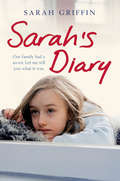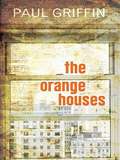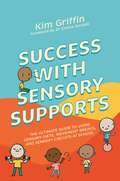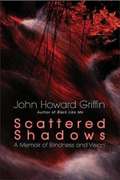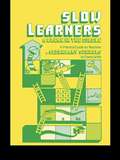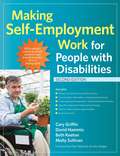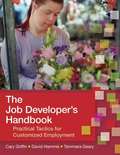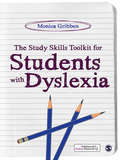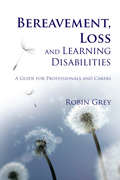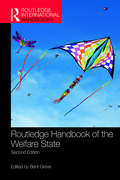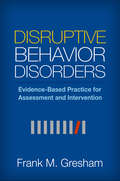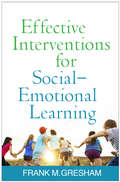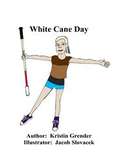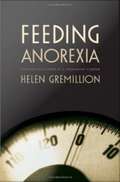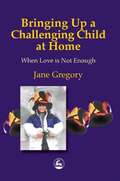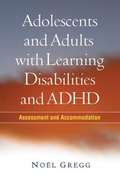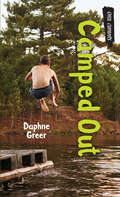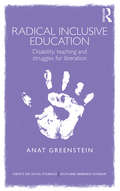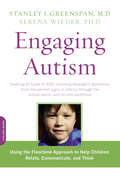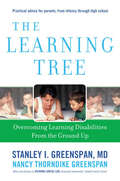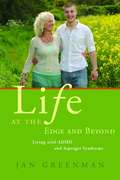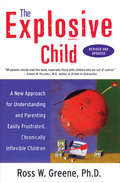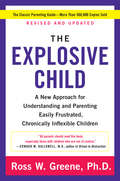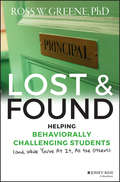- Table View
- List View
Sarah's Diary: An unflinchingly honest account of one family's struggle with depression
by Sarah Griffin'I was fourteen when I found my Dad trying to commit suicide in the garage. Sounds shocking doesn't it? But that was part of me, part of living with my Dad'Sarah's Diary is the very personal diary of Sarah Griffin - an ordinary teenage girl learning to deal with the ups and downs of family life. On the outside hers was like any other family, but behind closed doors lay a sad and lonely secret. Sarah's Dad had depression -- a condition we've all heard of but seldom discuss. Beautifully written, brutally honest, Sarah's story is compelling reading.
The Orange Houses
by Paul GriffinTamika Sykes, AKA Mik, is hearing impaired and way too smart for her West Bronx high school. She copes by reading lips and selling homework answers, and looks forward to the time each day when she can be alone in her room drawing. She's a tough girl who mostly keeps to herself and can shut anyone out with the click of her hearing aid. But then she meets Fatima, a teenage refugee who sells newspapers, and Jimmi, a homeless vet who is shunned by the rest of the community, and her life takes an unexpected turn.
Success with Sensory Supports: The ultimate guide to using sensory diets, movement breaks, and sensory circuits at school
by Kim GriffinSensory needs are being recognised as a vital part of learning, development and engagement within the classroom and are being used more often to make education both accessible and fun. To harness the full potential of sensory supports, using these strategies correctly is key!This is the essential guide to using sensory strategies successfully with school children, from occupational therapist, Kim Griffin, who has 20 years of experience supporting sensory needs.As you make your way through the book, you will be joined by Isla and Noah, two children whose stories will help illustrate how information in the book can be used practically. In addition, the book includes personal anecdotes from Kim, links to further reading, reflective questions and teacher perspectives to show how a teacher might use the information in the classroom. These features will help you easily identify sensory needs and use sensory tools effectively.
Scattered Shadows: A Memoir of Blindness and Vision
by John Howard GriffinThis extraordinary chronicle from the author of "Black Like Me" about his loss of sight is a powerful testament to the human spirit. Edited and introduced by Robert Bonazzi
Slow Learners: A Break in the Circle - A Practical Guide for Teachers
by Diane GriffinFirst Published in 1978. Routledge is an imprint of Taylor & Francis, an informa company.
Making Self-Employment Work for People with Disabilities (Second Edition)
by Cary Griffin David Hammis Beth Keeton Molly Sullivan<p>As self-employment becomes a viable option for more and more adults with significant disabilities, give them realistic, practical guidance and support with the NEW edition of this popular guidebook. Updated with a new and improved assessment approach, more self-employment success stories, and the latest on policy changes and online opportunities, this book is your step-by-step guide to helping adults with disabilities get a small business off to a strong start. You'll discover the nuts and bolts of person-centered business planning, and you'll get concrete, step-by-step strategies for every aspect, from business plans to marketing to finances. A must-have resource for employment specialists, transition professionals, and individuals with disabilities and their families, this book is the go-to guide for turning a small business into a big success. <p> <p>SUPPORT PEOPLE WITH DISABILITIES AS THEY: <p> <li>discover their "personal genius" with a new assessment approach <li>build a thorough and professional business plan based on their goals and interests <li>successfully finance their small business using multiple revenue sources <li>market their business, from defining customers to advertising in a variety of media <li>maintain their benefits while navigating financial and social security systems <li>make the most of valuable support from rehabilitation personnel, vocational counselors, school transition staff, and community programs</li> </p>
The Job Developer's Handbook: Practical Tactics for Customized Employment
by Cary Griffin David Hammis Tammara Geary<p>One of the most practical employment books available, this forward-thinking guide walks employment specialists step by step through customized job development for people with disabilities, revealing the best ways to build a satisfying, meaningful job around a person's preferences, skills, and goals. Internationally known for their innovative, proactive job development strategies, the authors motivate readers to expand the way they think about employment opportunities and develop creative solutions. <p>Readers will get fresh, proven tips and ideas for every aspect of job development for youth and adults with significant support needs: <p> <li>discovering who the person is and what he or she really wants <li>ensuring goodness of fit between employer and employee <li>finding—or creating—"hidden jobs" in smaller companies <li>empowering people through resource ownership (investing in resources that employers need) <li>skillfully negotiating job duties while managing conflicts that might arise <li>creatively maximizing benefits using social security work incentives <li>encouraging family support while respecting the individual as an adult</li> <p> <p>To make each part of job development easier, the book arms readers with practical content they can really use: easy-to-follow, step-by-step guidelines; checklists of critical questions to answer; success stories in both urban and rural settings; and sample scenarios, dialogues, and interview questions. <p>Equally useful to veteran professionals and those just starting out, this compelling guidebook breathes new life into the job development process and helps readers imagine a wider world of employment opportunities for people with disabilities.</p>
The Study Skills Toolkit for Students with Dyslexia (Sage Study Skills Ser.)
by Monica Gribben'This toolkit is the student's safety net offering user friendly, down to earth advice and real life skills that have been tried and tested by the author'-Dr John Schneider, Educational Psychologist, Edinburgh 'This is exactly how I felt starting university ... a wonderful and very helpful book full of interesting and useful hints and tips on how to survive university as a dyslexic student. It doesn't make you feel silly or stupid but makes you feel you can achieve what you set out to do'-Sharon Patterson, Adult Nursing student, Edinburgh Napier University 'You realize you're in the hands of a professional who has taught thousands of students how to succeed at university'-Holly Pellicer, Dyslexia Advisor, University of Oslo Packed with helpful advice, checklists and templates, this book will help you improve your study skills throughout your time at university. Written in a straightforward, no- nonsense style, the guidance can be broken down into manageable chunks. Issues covered include: - procrastination - planning your assignment - understanding your essay question - researching, writing and referencing your written work - managing your own well-being. Drawing on years of experience running study skills workshops in higher education, Monica Gribben has written an accessible book for students with dyslexia that shows how to work through the challenges that studying presents. The companion Website www.sagepub.co.uk/gribben has podcasts, worksheets and electronic resources to support each chapter. Monica Gribben is a private dyslexia consultant and Dyslexia Adviser at Edinburgh Napier University.
Bereavement, Loss and Learning Disabilities
by Robin GreyLosing a loved one and coping with the subsequent adjustments that follow are a difficult fact of life, but people with learning disabilities face specific difficulties in processing and managing these changes. Adopting an integrative approach, this book acknowledges the importance of helping relationships in supporting this vulnerable group through periods of loss and bereavement. The author explains how to engage the person with a learning disability in talking therapy by creating an open dialogue. Common signs of stress, factors to consider in assessing risk and advice on how best to approach difficult subjects are presented. The role of supervision in counselling and issues surrounding terminal illness are also discussed, and practical solutions offered. Professionals working in the field of learning disabilities, such as counsellors, therapists, carers and health and social care students will find this informed guide beneficial in communicating and supporting people with learning disabilities.
Routledge Handbook of the Welfare State (Routledge International Handbooks)
by Bent GreveForty-five contributions from renowned international specialists in the field provide readers with expert analysis of the core issues related to the welfare state, including regional depictions of welfare states around the globe. The second edition of the Routledge Handbook of the Welfare State combines essays on methodologies, core concepts and central policy areas to produce a comprehensive understanding of what ‘the welfare state’ means around the world. In the aftermath of the credit crunch, the Handbook addresses some of the many questions about the welfare state. This second edition has been thoroughly revised and updated to include an in-depth analysis of societal changes in recent years. New articles can be found on topics such as: the impact of ideas, well-being, migration, globalisation, India, welfare typologies, homelessness and long-term care. This volume will be an invaluable reference book for students and scholars throughout the social sciences, particularly in sociology, social policy, public policy, international relations, politics and gender studies.
Disruptive Behavior Disorders
by Frank M. GreshamSchools often resort to ineffective, punitive interventions for the 10% of K-8 students whose challenging behavior interferes with their own and their classmates' learning. This book fills a crucial need by describing ways to provide meaningful supports to students with disruptive behavior disorders. Prominent authority Frank M. Gresham weaves together current research, assessment and intervention guidelines, and illustrative case studies. He reviews a broad range of evidence-based practices and offers recommendations for selecting, implementing, and evaluating them within a multi-tiered framework. Coverage includes school- and home-based approaches, multicomponent programs, prevention strategies, and social skills training.
Effective Interventions for Social-Emotional Learning
by Frank M. GreshamThis book reviews evidence-based, multi-tiered practices for promoting social-emotional learning (SEL) with typically developing students as well as those with special needs. Leading authority Frank M. Gresham, codeveloper of the Social Skills Improvement System--Rating Scales, describes how to systematically assess K-12 students' social skills and plan and implement universal, selected, and intensive interventions. His approach is grounded in cutting-edge research on social-emotional competencies and their role in adjustment and academic achievement. Emphasizing what works, the book showcases programs and strategies that are sequenced, active, focused, and explicit. Detailed case examples and lesson plans illustrate different levels and types of SEL intervention. Reproducible assessment tools can be downloaded and printed in a convenient 8 1/2" x 11" size.
Feeding Aorexia: Gender and Power at a Treatment Center
by Helen GremillionFeeding Anorexia challenges prevailing assumptions regarding the notorious difficulty of curing anorexia nervosa. Through a vivid chronicle of treatments at a state-of-the-art hospital program, Helen Gremillion reveals how the therapies participate unwittingly in culturally dominant ideals of gender, individualism, physical fitness, and family life that have contributed to the dramatic increase in the incidence of anorexia in the United States since the 1970s. She describes how strategies including the meticulous measurement of patients' progress in terms of body weight and calories consumed ultimately feed the problem, not only reinforcing ideas about the regulation of women's bodies, but also fostering in many girls and women greater expertise in the formidable constellation of skills anorexia requires. At the same time, Gremillion shows how contradictions and struggles in treatment can help open up spaces for change. Feeding Anorexia is based on fourteen months of ethnographic research in a small inpatient unit located in a major teaching and research hospital in the western United States. Gremillion attended group, family, and individual therapy sessions and medical staff meetings; ate meals with patients; and took part in outings and recreational activities. She also conducted over one hundred interviews-with patients, parents, staff, and clinicians. Among the issues she explores are the relationship between calorie-counting and the management of consumer desire; why the "typical" anorexic patient is middle-class and white; the extent to which power differentials among clinicians, staff, and patients model "anorexic families"; and the potential of narrative therapy to constructively reframe some of the problematic assumptions underlying more mainstream treatments.
Bringing Up a Challenging Child at Home
by Jane GregoryChrissy is Jane Gregory's oldest child, an attractive girl with a tremendous sense of fun. She also exhibits behaviour which other people find challenging - screaming fits, stripping off her clothes, violent outbursts and self-mutilation. It was apparent from an early age that Chrissy had a learning disability, and subsequently as an adult she was diagnosed with a rare chromosome disorder and autism. In Bringing Up a Challenging Child at Home, Jane Gregory describes her life with Chrissy candidly and pragmatically. She relates her struggles to cope with Chrissy's difficult behaviour, the effects on the rest of the family, and her attempts to understand the reasons behind it. Offering practical advice for other parents, she explains how she got the right support and effective treatment. Her story provides professionals as well as parents with a unique insight into what it is like to bring up a complex and challenging child.
Adolescents and Adults with Learning Disabilities and ADHD
by Noël GreggMost of the literature on learning disabilities and attention-deficit/hyperactivity disorder (ADHD) focuses on the needs of elementary school-age children, but older students with these conditions also require significant support. Comprehensive and authoritative, this book helps educators and clinicians navigate the maze of laws, policies, and scientific research relating to diagnostic and intervention decision making for adolescents and adults. Leading expert No\u00ebl Gregg provides clear guidance on how to conduct and document evidence-based assessments and select appropriate instructional and testing accommodations. Featuring helpful case vignettes, decision-making flowcharts, and coverage of the latest assistive technologies, the book gives special attention to supporting students during the crucial transition from high school to higher education or vocational settings.
Camped Out (Orca Currents)
by Daphne GreerMax knows his mom can't afford to send him to summer camp. But he really, really wants to go. He needs a break from looking after his autistic brother, Duncan. And from his mom's new boyfriend. He is surprised when his mom says that he can go after all. But there's a catch. There are spots available at the camp for families with special needs. A grant would cover Duncan's fees, and Max could attend at no charge. If he goes as Duncan's escort. This is the second story featuring Max and Duncan after Maxed Out.
Radical Inclusive Education: Disability, teaching and struggles for liberation (Concepts for Critical Psychology)
by Anat GreensteinMany people who work in education start out with enthusiastic ideals about education as a positive force that can spur change in the life of the learner and in society at large, yet find themselves frustrated with a bureaucratic system that often alienates and excludes many of its students. This is particularly true for students identified as having "special educational needs" (SEN) or disability, a label often used to justify the ways in which students are failed by a system that focuses on narrow definitions of knowledge, seeks to normalise and control behaviour, and values economic productivity over other forms of human activity. Radical Inclusive Education explores how current educational practices, such as standardised tests and league tables, exclude and fail many disabled students, and naturalise educational inequalities around gender, class, ethnicity and ability. Informed by the social model of disability, the book argues that educational theories and practices that are geared towards social justice and inclusion need to recognise and value the diversity of human embodiments, needs and capacities, and foster pedagogical practices that support relations of interdependency. The book draws on work in disability studies, critical psychology and critical pedagogy, and also real life examples from interviews with activists in the disabled people’s movement, and from research in a school, to offer examples of what radical inclusive education – that is sensitive to the needs of all students – might look like in practice. As such, it will be of great interest to practitioners and students in the field of education, particularly for those interested in SEN and disability, sociology of education, critical pedagogy, informal education and social movement learning.
Engaging Autism: Using the Floortime Approach to Help Children Relate, Communicate, and Think (A Merloyd Lawrence Book)
by Stanley I. Greenspan Serena WiederGrateful parents and professionals worldwide have welcomed this essential guide to the highly recommended Floortime approach for treating children with any of the autism spectrum disorders (ASD). Now available in paperback, Engaging Autism includes new, exciting information on neuroscience research into the effects of this approach, plus guidance for parents navigating the controversies surrounding the treatment of autism. Unlike approaches that focus on changing specific behavior, Greenspan’s program promotes the building blocks of healthy emotional and behavioral development. He shows that, remarkably, children with ASD do not have a fixed, limited potential, and may often join their peers to lead full, psychologically healthy lives. The Floortime approach can also be applied at any age--including early infancy, when the first signs of risk for ASD may appear--so that preventing the full development of autism becomes a real possibility.
The Learning Tree: Overcoming Learning Disabilities from the Ground Up (A Merloyd Lawrence Book)
by Stanley I. Greenspan Nancy Thorndike GreenspanThe internationally admired author of "Engaging Autism" shows parents how to get to the roots of learning disabilities and unleash each childOCOs intellectual potential
Life at the Edge and Beyond
by Jan GreenmanParenting a child with Asperger's syndrome is never easy, and adding ADHD to the psychological mix makes life even more difficult. In this searingly honest account of bringing up her son, Luke, Jan Greenman challenges common perceptions of a 'life with labels', and recalls her family's 18 year journey to the edge and back. Writing frankly about the medical issues of Luke's early years, including the impact of MMR and Ritalin, Jan recalls how Luke's diagnoses came about, and how life at The Edge, their aptly named family home, changed as a result. She describes the causes and effects of the behaviours associated with Luke's conditions, and the impact they had on each family member, including his younger sister, Abbi. The only predictable thing about Luke is his unpredictability, and Jan also takes a light-hearted look at some of his more unusual habits and obsessions. The book includes tips and advice from Jan, Abbi, and Luke himself, and the final chapters go beyond Luke's early years to look at his life as a teenager - his solo trip to Dubai, and subsequent encounter with customs, his expulsion from school, and the inspirational Headteacher who helped him to turn his life around. Life at the Edge and Beyond is a must for anyone involved in bringing up a child with Asperger's syndrome, ADHD - or both. Parents will take from the family's successes, learn from their mistakes, and realize that, no matter how close to the edge they may feel, they are never alone.
The Explosive Child: A New Approach for Understanding and Parenting Easily Frustrated, "Chronically Inflexible" Children
by Ross W. GreeneWhat's an explosive child? A child who responds to routine problems with extreme frustration-crying, screaming, swearing, kicking, hitting, biting, spitting, destroying property, and worse. A child whose frequent, severe outbursts leave his or her parents feeling frustrated, scared, worried, and desperate for help. Most of these parents have tried everything--reasoning, explaining, punishing, sticker charts, therapy, medication-- but to no avail. They can't figure out why their child acts the way he or she does; they wonder why the strategies that work for other kids don't work for theirs; and they don't know what to do instead. Dr. Ross Greene, a distinguished clinician and pioneer in the treatment of kids with social, emotional, and behavioral challenges, has worked with thousands of explosive children, and he has good news: these kids aren't attention-seeking, manipulative, or unmotivated, and their parents aren't passive, permissive pushovers. Rather, explosive kids are lacking some crucial skills in the domains of flexibility/adaptability, frustration tolerance, and problem solving, and they require a different approach to parenting. Throughout this compassionate, insightful, and practical book, Dr. Greene provides a new conceptual framework for understanding their difficulties, based on research in the neurosciences. He explains why traditional parenting and treatment often don't work with these children, and he describes what to do instead. Instead of relying on rewarding and punishing, Dr. Greene's Collaborative Problem Solving model promotes working with explosive children to solve the problems that precipitate explosive episodes, and teaching these kids the skills they lack.
The Explosive Child
by Ross W. GreeneScreaming, swearing, crying, hitting, kicking, spitting, biting...these are some of the challenging behaviors we see in kids who are having difficulty meeting our expectations. These behaviors often leave parents feeling frustrated, angry, overwhelmed, and desperate for answers. In this fully revised and updated book, Dr. Ross Greene helps you understand why and when your child does these things and how to respond in ways that are nonpunitive, nonadversarial, humane, and effective.Dr. Greene describes how best to: Understand the factors that contribute to challenging episodes. Identify the specific situations in which challenging episodes are likely to occur. Reduce or eliminate challenging episodes by solving the problems that cause them. Solve problems collaboratively (rather than unilaterally) and proactively (rather than reactively). Help your child develop the skills to be more flexible, solve problems, and handle frustration more adaptively. Reduce hostility and antagonism between you and your child.With Dr. Greene's practical, expert guidance, you and your child will forge a new relationship based on communication and mutual respect.
The Explosive Child
by Ross W. GreeneWhat's an explosive child? A child who responds to routine problems with extreme frustration-crying, screaming, swearing, kicking, hitting, biting, spitting, destroying property, and worse. A child whose frequent, severe outbursts leave his or her parents feeling frustrated, scared, worried, and desperate for help. Most of these parents have tried everything-reasoning, explaining, punishing, sticker charts, therapy, medication-but to no avail. They can't figure out why their child acts the way he or she does; they wonder why the strategies that work for other kids don't work for theirs; and they don't know what to do instead. Dr. Ross Greene, a distinguished clinician and pioneer in the treatment of kids with social, emotional, and behavioral challenges, has worked with thousands of explosive children, and he has good news: these kids aren't attention-seeking, manipulative, or unmotivated, and their parents aren't passive, permissive pushovers. Rather, explosive kids are lacking some crucial skills in the domains of flexibility/adaptability, frustration tolerance, and problem solving, and they require a different approach to parenting. Throughout this compassionate, insightful, and practical book, Dr. Greene provides a new conceptual framework for understanding their difficulties, based on research in the neurosciences. He explains why traditional parenting and treatment often don't work with these children, and he describes what to do instead. Instead of relying on rewarding and punishing, Dr. Greene's Collaborative Problem Solving model promotes working with explosive children to solve the problems that precipitate explosive episodes, and teaching these kids the skills they lack.
Lost and Found: Helping Behaviorally Challenging Students (and, While You're At It, All the Others)
by Ross W. GreeneImplement a more constructive approach to difficult students Lost and Found is a follow-up to Dr. Ross Greene's landmark works, The Explosive Child and Lost at School, providing educators with highly practical, explicit guidance on implementing his Collaborative & Proactive Solutions (CPS) Problem Solving model with behaviorally-challenging students. While the first two books described Dr. Greene's positive, constructive approach and described implementation on a macro level, this useful guide provides the details of hands-on CPS implementation by those who interact with these children every day. Readers will learn how to incorporate students' input in understanding the factors making it difficult for them to meet expectations and in generating mutually satisfactory solutions. Specific strategies, sample dialogues, and time-tested advice help educators implement these techniques immediately. The groundbreaking CPS approach has been a revelation for parents and educators of behaviorally-challenging children. This book gives educators the concrete guidance they need to immediately begin working more effectively with these students. Implement CPS one-on-one or with an entire class Work collaboratively with students to solve problems Study sample dialogues of CPS in action Change the way difficult students are treated The discipline systems used in K-12 schools are obsolete, and aren't working for the kids to whom they're most often applied - those with behavioral challenges. Lost and Found provides a roadmap to a different paradigm, helping educators radically transform the way they go about helping their most challenging students.
